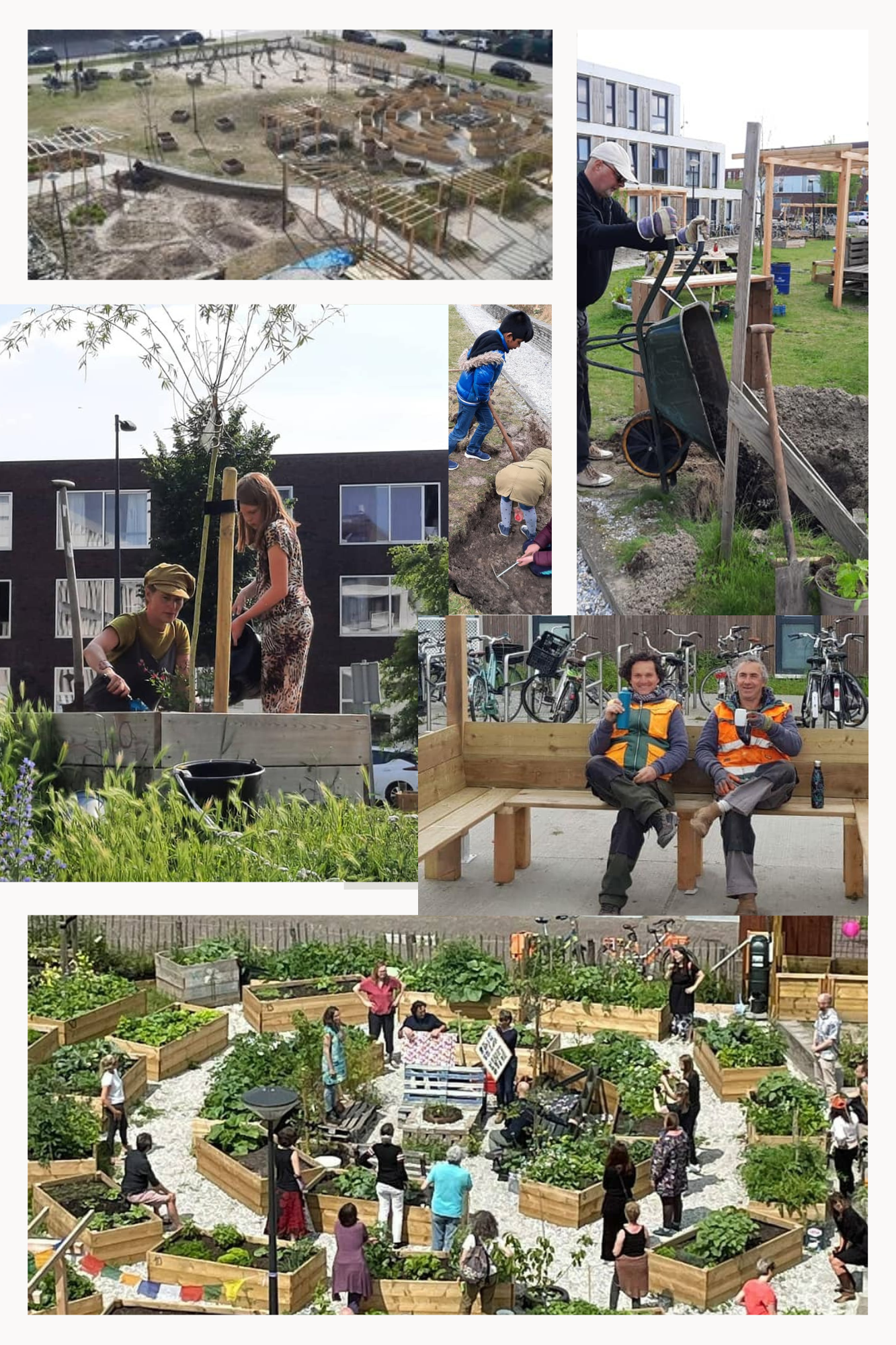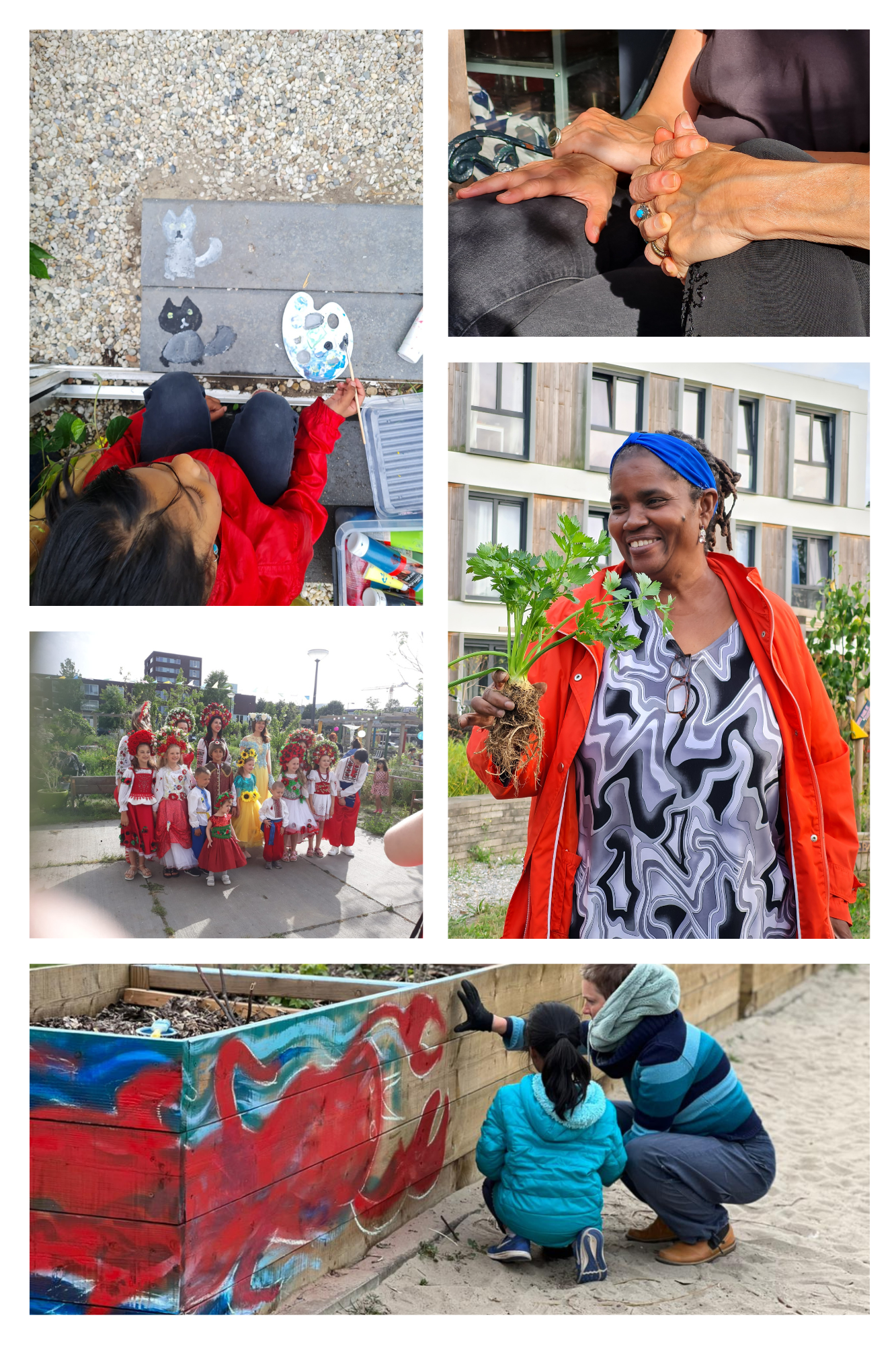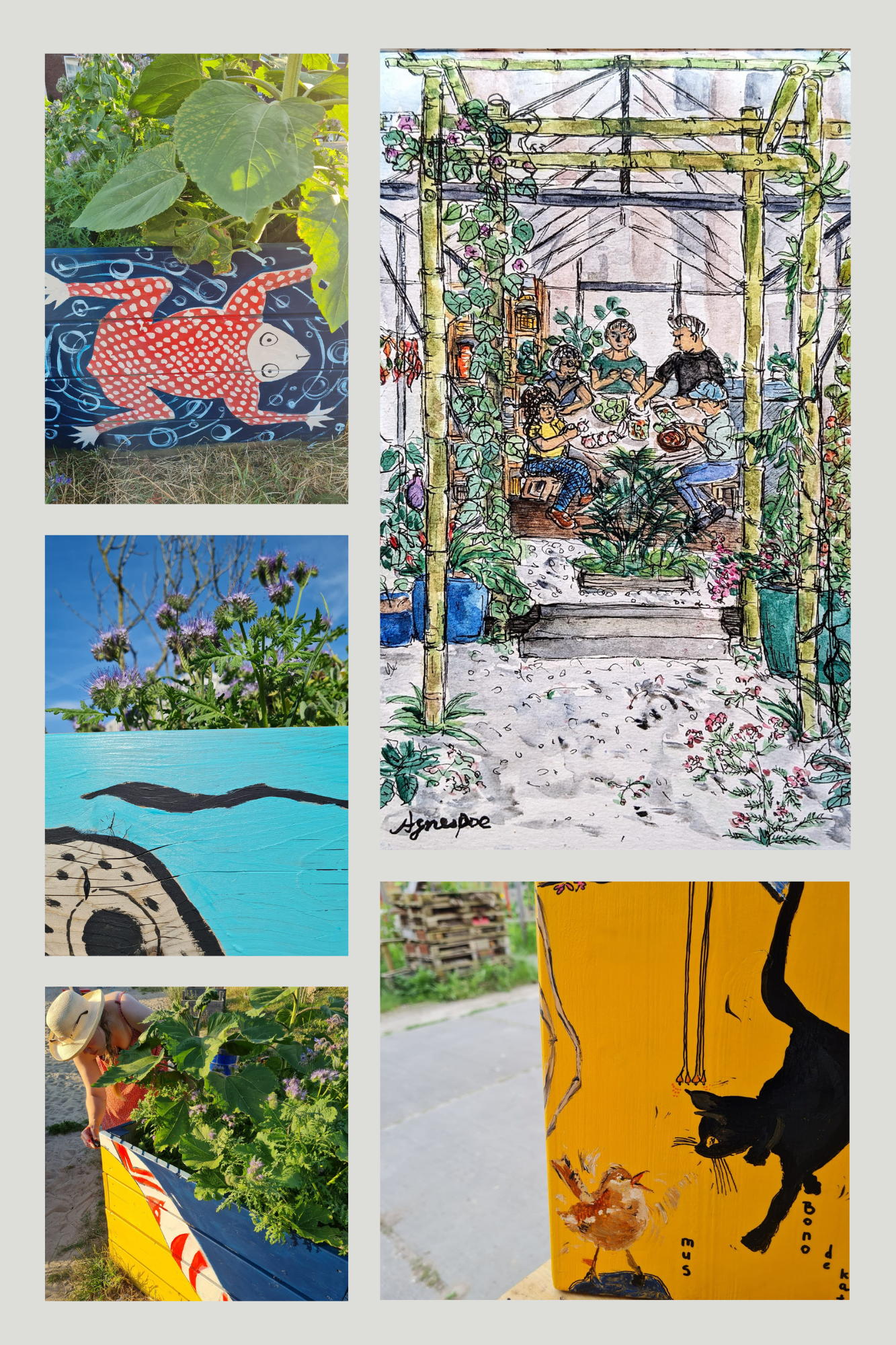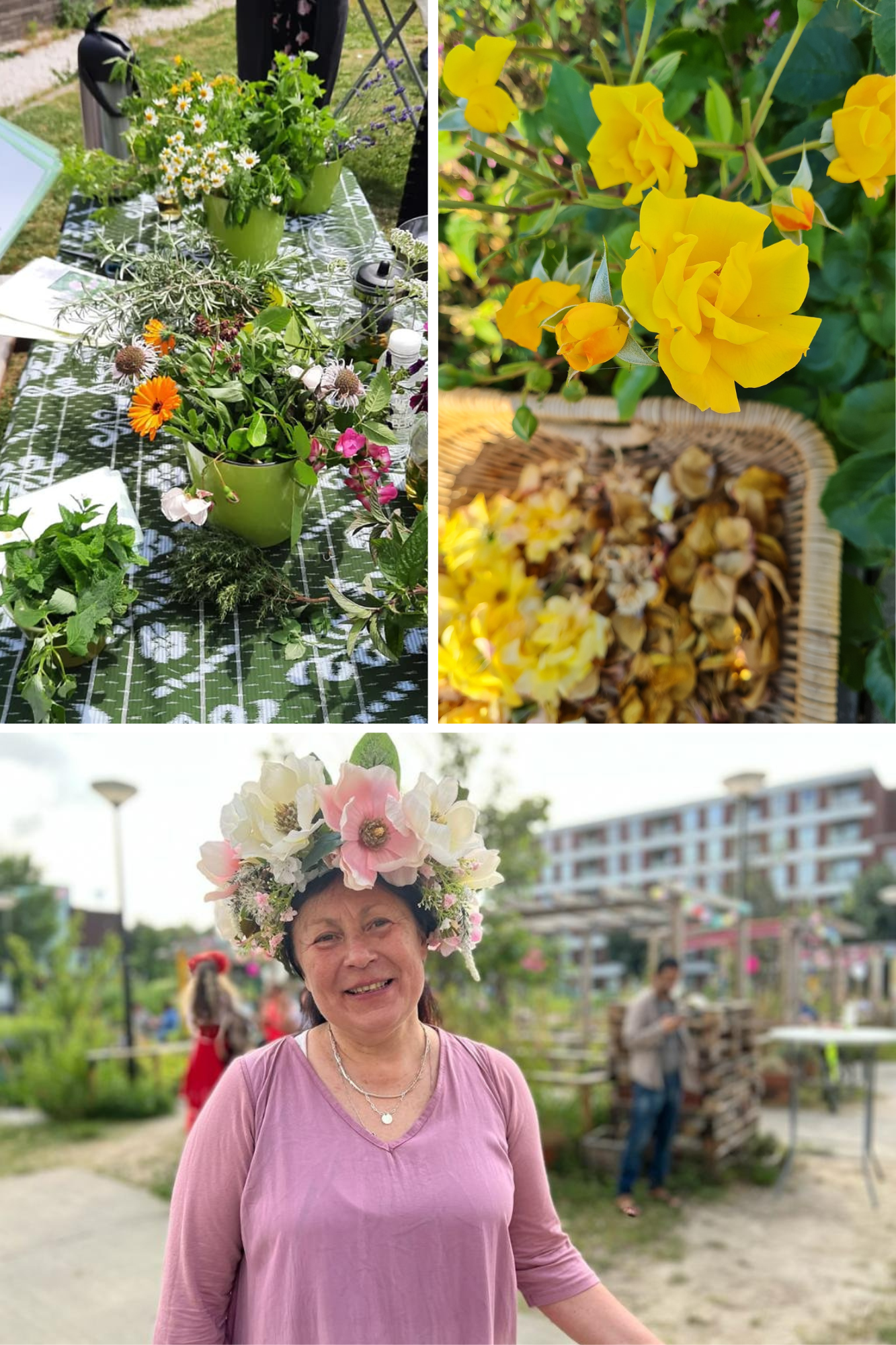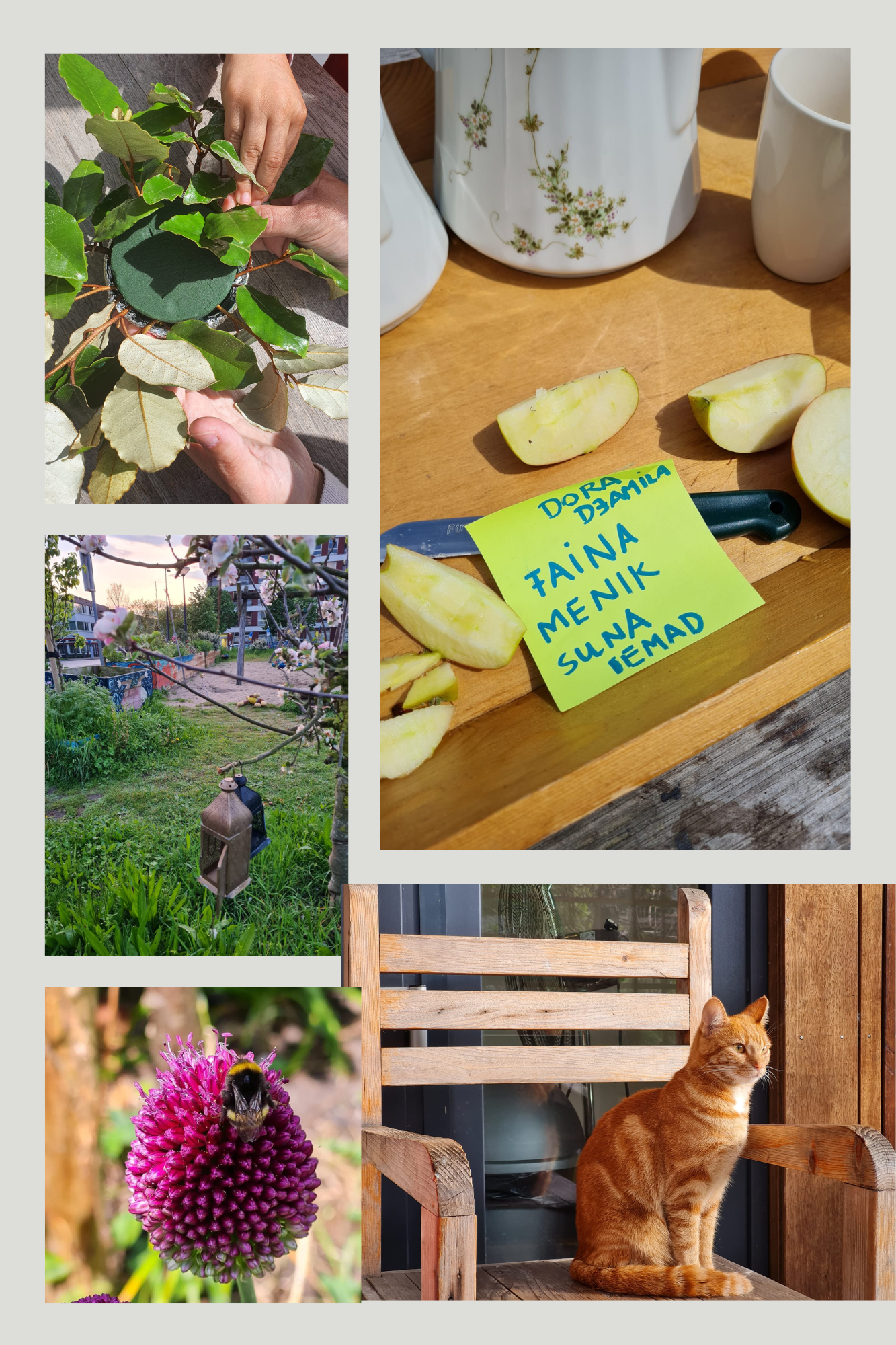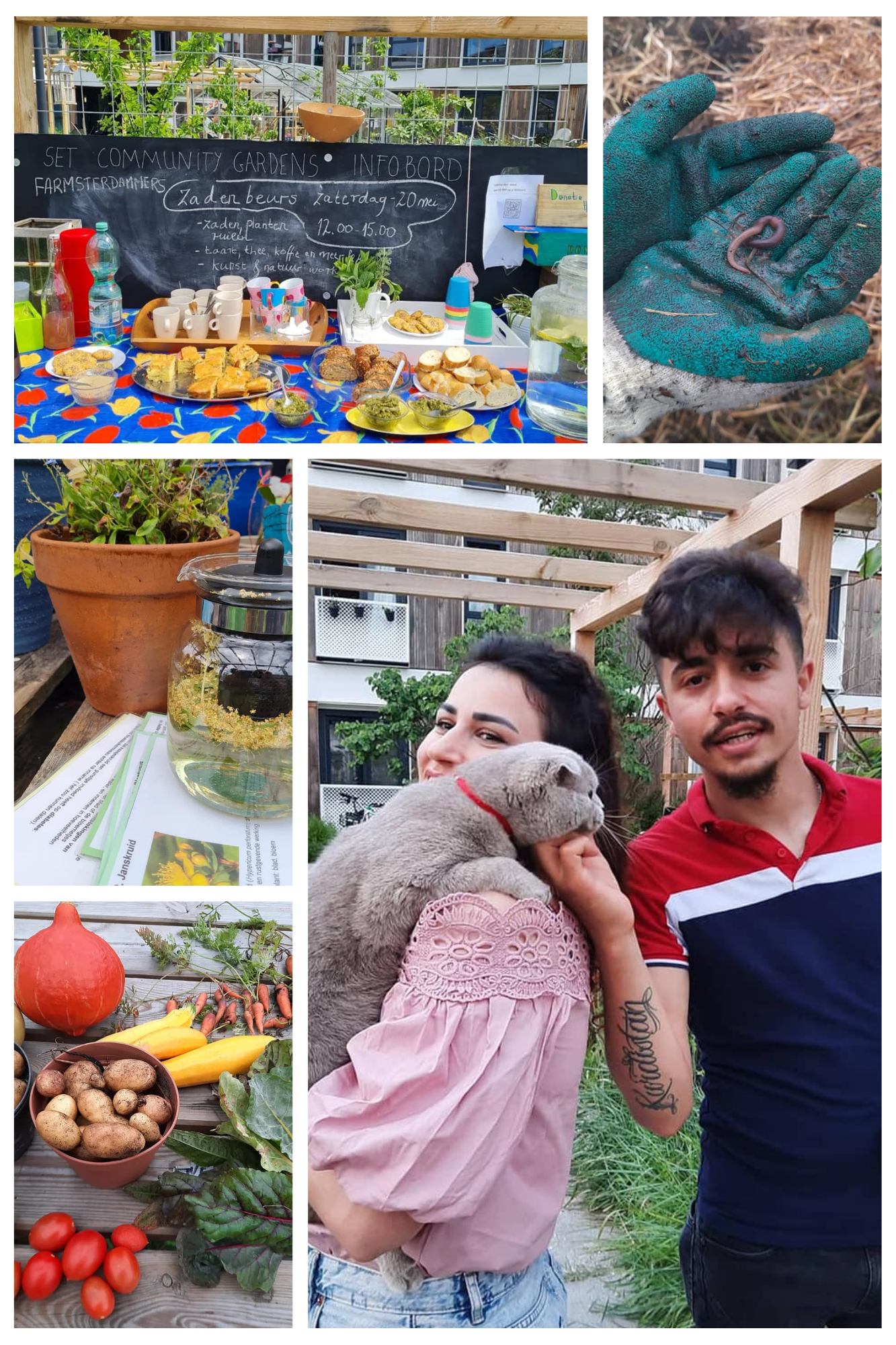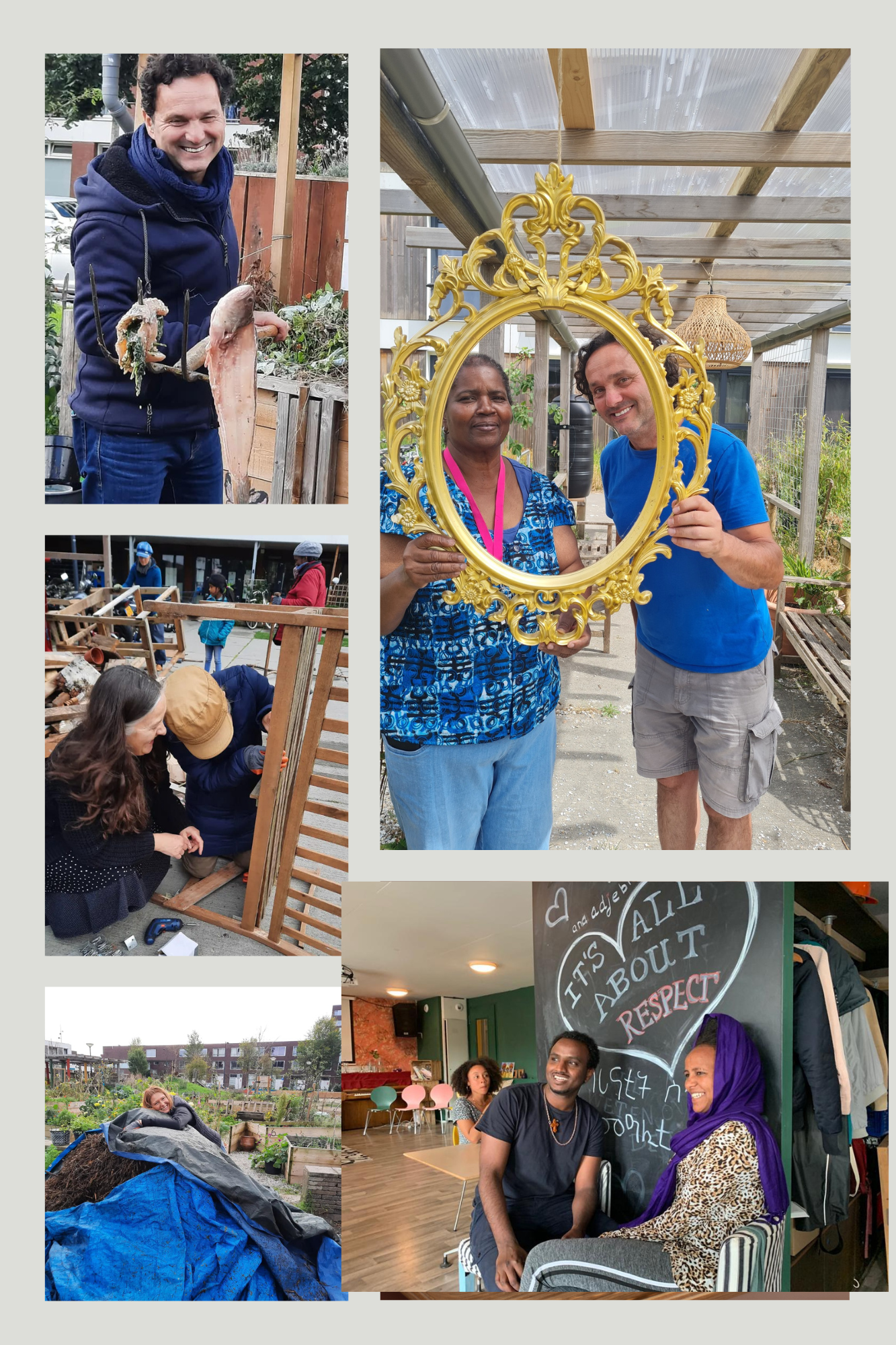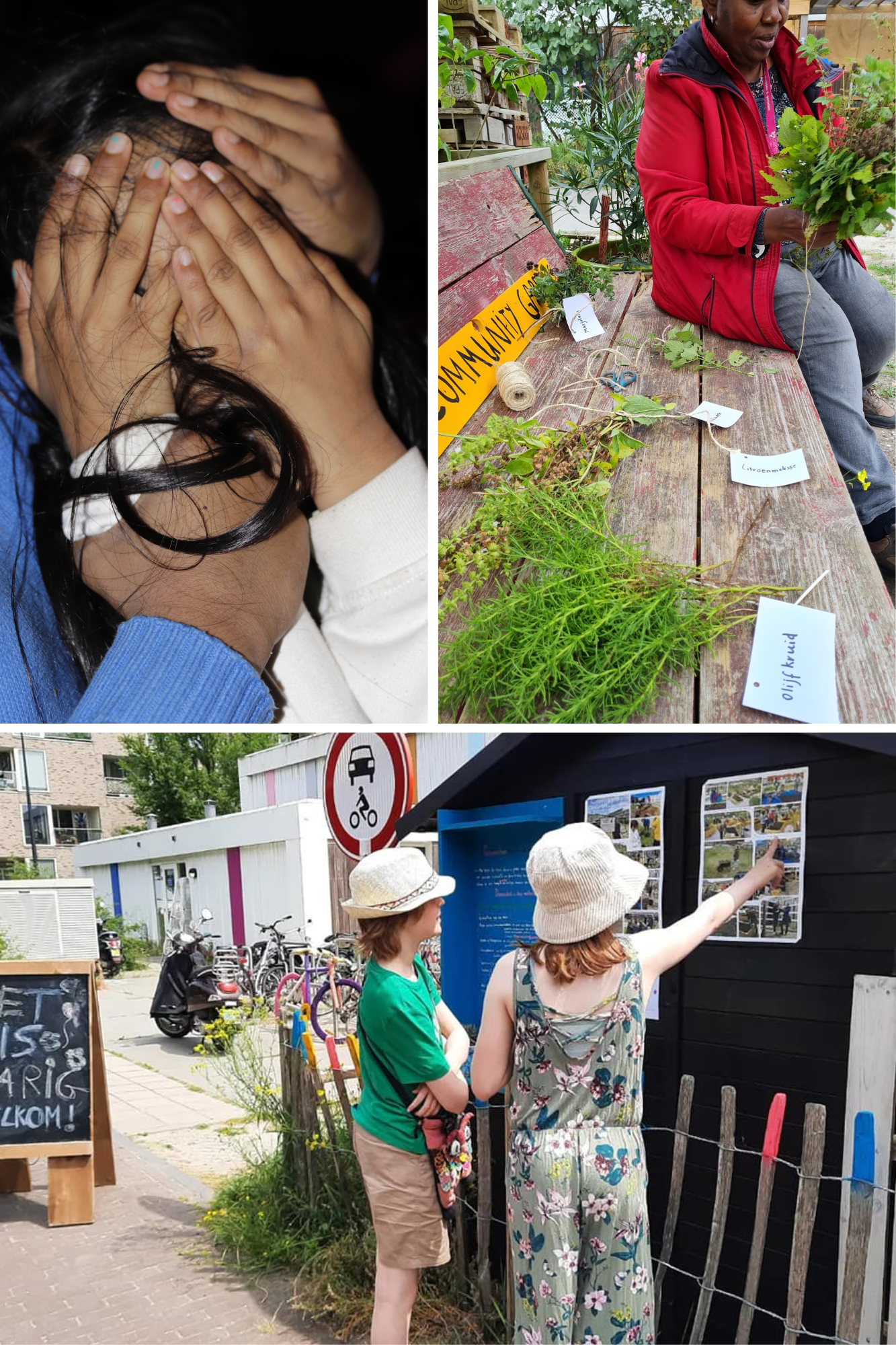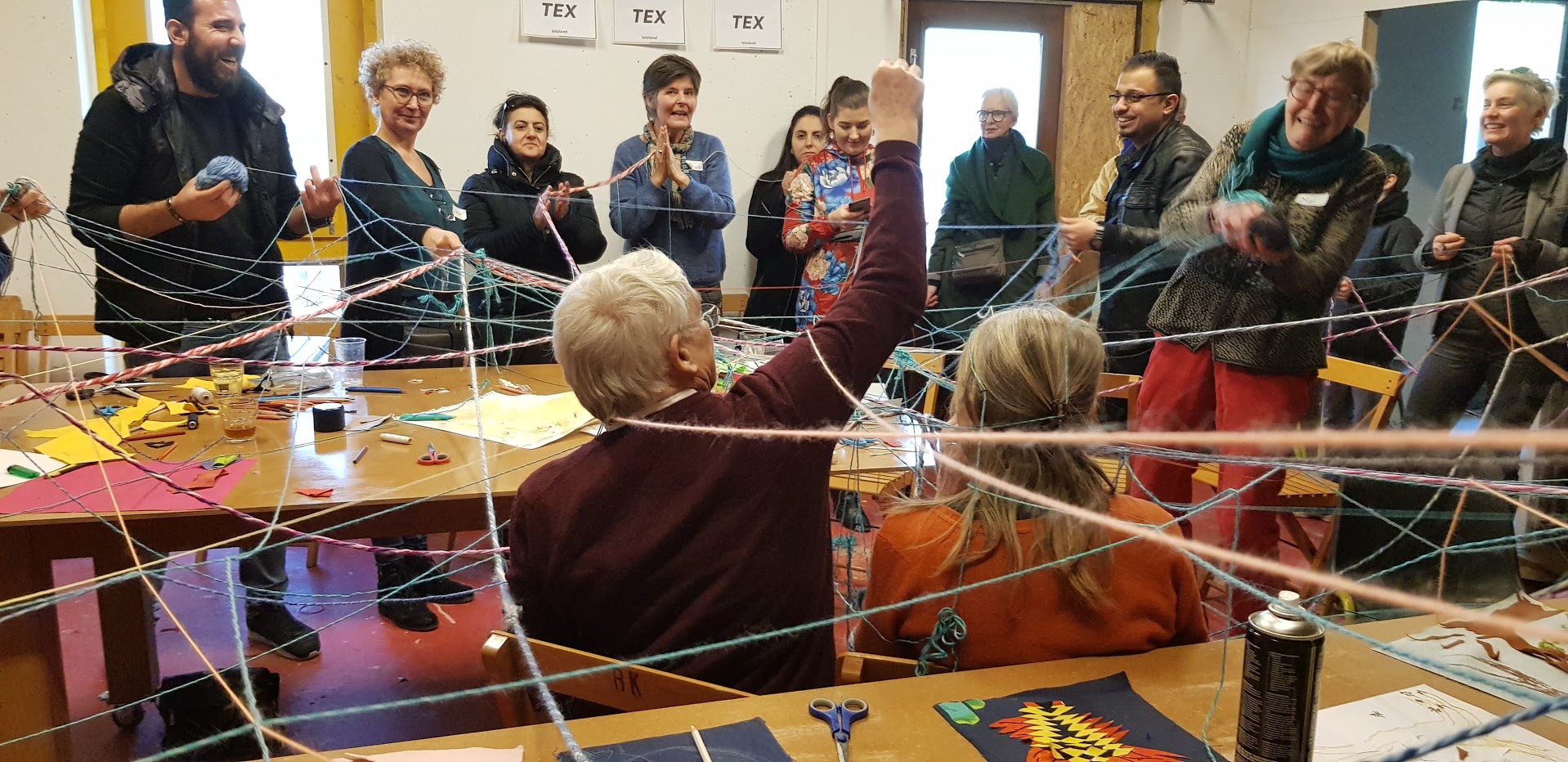Regaining a sense of belonging
SET Community Gardens
SET Community Gardens and Center for social inclusion and community building
Initiated by volunteers in Amsterdam-Ijburg, SET is a regenerated public space turned since 2021 into a permaculture community garden and center. Located next to a playground and temporary residency for young status holders and students, SET applies spatial participatory co-design to connect intergenerational communities from diverse socio-cultural backgrounds. At SET all kinds of human strengths and vulnerabilities are present and evolve in synergy just like in nature on shared activities.
EU Member State, Western Balkans or Ukraine
Netherlands
Local
Amsterdam
No
No
Mainly urban
It refers to a physical transformation of the built environment (hard investment)
Yes
2023-08-30
No
No
No
As a representative of an organisation
The SET Community Garden and Center was established after the first COVID-19 emergency to provide a safe and accessible public space for the local community to reconnect with nature and each other. SET is in the IJburg-Amsterdam neighborhood, with a high population of disadvantaged people and elderly residents. The area is diverse, with a significant presence of young families from migrant, second-generation, and expat communities. However, there are few free aggregation centers, creating a sense of urgency within the community to fill the social and personal void.
SET has two specific objectives: 'grounding' and 'belonging'. Learning with nature is a bonding activity that allows us to include diversity, express creativity, and address daily needs. The continuous cooperation and regeneration, both through nature and with interpersonal experiences, fosters a practice of healing.
The permaculture garden and the neighborhood room - Wereldhhuiskamer - provide social integration, exchange, and support. At SET, being connected with plants and feeling part of a thriving community profoundly influences people's lives and well-being, improving self-empowerment and self-esteem. The "inside" and "outside area" mutually support and complement each other. The healing center and home-away-from-home feeling are apparent within the intra-generational community of participants.
The center offers many free activities, such as social cooking classes, neighborhood dinners, language courses, a repair café, permaculture and organic gardening, as well as children's art workshops - all run by volunteers. These activities have grown into a stable weekly routine, attracting diverse participants and facilitators from all kinds of social, cultural, and age groups.
SET has two specific objectives: 'grounding' and 'belonging'. Learning with nature is a bonding activity that allows us to include diversity, express creativity, and address daily needs. The continuous cooperation and regeneration, both through nature and with interpersonal experiences, fosters a practice of healing.
The permaculture garden and the neighborhood room - Wereldhhuiskamer - provide social integration, exchange, and support. At SET, being connected with plants and feeling part of a thriving community profoundly influences people's lives and well-being, improving self-empowerment and self-esteem. The "inside" and "outside area" mutually support and complement each other. The healing center and home-away-from-home feeling are apparent within the intra-generational community of participants.
The center offers many free activities, such as social cooking classes, neighborhood dinners, language courses, a repair café, permaculture and organic gardening, as well as children's art workshops - all run by volunteers. These activities have grown into a stable weekly routine, attracting diverse participants and facilitators from all kinds of social, cultural, and age groups.
Grounding
Belonging
Social integration
Sustainability
Organic-regenerative
We believe that creating a safe and healthy environment for individuals and communities to heal, learn, and act together is crucial to building sustainable societies. Our community is deeply embedded in the life of the neighborhood, and we are physically located in a vast, open, urban public space. SET is a home and shelter to diverse people and growing fauna, surrounded by a rich flora and a cozy multifunctional space. Our main objective was to create an urban garden and a community center that are accessible to everyone and entirely sustained by volunteers. SET is exemplary in its enriching, inclusive, and integrated approach to addressing the neighborhood's flora and fauna needs based on self-sustainability, recycling, and circularity. In the past three years, our volunteers have managed to harvest healthy organic seasonal food, and we offer spaces to the community to grow their own vegetables. Today, the self-sustainable green area comprises evergreens, shrubs, vegetables, flowers, berries, fruit trees, herbs, and water plants that grow harmoniously, providing habitats for pollinators and pleasing humans' senses with colors and smells. This includes reducing the number and quantity of inputs and fostering the recycling of green waste to produce compost and mulch. Most constructions in the garden, such as pavilions, the greenhouse, and patio areas, are made with recycled materials, promoting circularity. Additionally, we have embraced circularity principles by promoting neighborhood collaboration through our Repair Cafe. Community members assist their neighbors weekly in repairing bikes, clothes, furniture, and home hardware, creating social and environmental benefits for the neighborhood. To share experiences and actively participate in international discourses for a healthier, happier, and greener world, SET also seeks connections with other similar initiatives at national, European, and global levels.
“Building the shed yesterday was really healing for me. The little girl, the young woman and the old granma are growing strong in me. Thank you.” Faina, 65, from Curacao
“Every day is a gift to walk through the garden. You always can find something unexpected, a hidden beauty.” SET resident, 25, from NL
“My pain goes away for those moments when we are here together.” Henny, 75, from Amsterdam
Beauty is a fundamental aspect of our project. It represents the beauty of nature, which is easy, simple, diverse, and accessible. It also describes the beauty of social encounters such as love, trust, and intimacy. The beauty of simplicity, spontaneity, and presence in our relationships inspires us to create art and craft, regardless of our education, background, or age. Our creative, open space invites people and artists from various areas and cultural experiences such as dance, music, visual art, performance art, and theater. They come to create with us and for us.
Beauty is perceived differently in various societies but is a basic human need. Nature gives us a 'democratic' beauty that is accessible to everyone. Therefore, we understand beauty's importance and simple power in our everyday practice. We have a solid visual imagination of creating a beautiful and functional space while allowing everyone to create, act, and bring their ideas. "Mooie lellijkheid" is our community's term for reusing all kinds of objects. We have learned the significance of personal connections with certain objects that make a sense of belonging, intimacy, and emotional connection with the space. We encourage the expression of unique beauty, helping people to see and appreciate the simple joy and beauty in life. This beauty is easily accessible, connected, healing, peaceful, and meditative. It inspires creativity and curiosity and has the power of healing for many of us.
“Every day is a gift to walk through the garden. You always can find something unexpected, a hidden beauty.” SET resident, 25, from NL
“My pain goes away for those moments when we are here together.” Henny, 75, from Amsterdam
Beauty is a fundamental aspect of our project. It represents the beauty of nature, which is easy, simple, diverse, and accessible. It also describes the beauty of social encounters such as love, trust, and intimacy. The beauty of simplicity, spontaneity, and presence in our relationships inspires us to create art and craft, regardless of our education, background, or age. Our creative, open space invites people and artists from various areas and cultural experiences such as dance, music, visual art, performance art, and theater. They come to create with us and for us.
Beauty is perceived differently in various societies but is a basic human need. Nature gives us a 'democratic' beauty that is accessible to everyone. Therefore, we understand beauty's importance and simple power in our everyday practice. We have a solid visual imagination of creating a beautiful and functional space while allowing everyone to create, act, and bring their ideas. "Mooie lellijkheid" is our community's term for reusing all kinds of objects. We have learned the significance of personal connections with certain objects that make a sense of belonging, intimacy, and emotional connection with the space. We encourage the expression of unique beauty, helping people to see and appreciate the simple joy and beauty in life. This beauty is easily accessible, connected, healing, peaceful, and meditative. It inspires creativity and curiosity and has the power of healing for many of us.
Our approach is based on systems and processes. Everyone has a unique role in the system, and we recognize individuals for their multiple qualities and exceptional contributions. Problems should not be isolated under particular lenses but shared for the sake of the person and the community. This is what makes our place really unique and inclusive.
We constantly fine-tune verbal and non-verbal communication and the physical space to be non-violent and welcoming. To improve participation, we address all the tensions beneath the surface - frustration, anxiety, isolation, illness, suffering, anger - often caused by inequality (social/cultural/gender/age/status/economic/conflicts/etc.). Everyone has a reason and a chance to take one step further.
Positive ownership fosters engagement, and feeling at home creates a sense of freedom and responsibility. These are essential qualities for humans to feel safe and empowered. When people are recognized, their voice is heard, and their creativity is celebrated, they become active actors in the space. This helps them develop those skills further in other domains of their lives and eventually create a practice of "active citizenship."
At SET, all activities are free. Donations are encouraged to cover expenses and investments, and in some cases, free solidarity contributions (such as Neighbor Dinners, Veggie boxes, etc.) allow more significant participation. We regularly seek further funding through individual applications to social funding and municipal programs and redistribute it into the project according to specific needs and goals.
While the number of participants can vary from time to time, a core group of active organizers - three people for the community center and three people for the garden - have had long-term engagement and vision in the project. They have been helped in their mission by larger groups organized into specific clusters, such as the vegetable and compost group, cooking club, language courses, etc.
We constantly fine-tune verbal and non-verbal communication and the physical space to be non-violent and welcoming. To improve participation, we address all the tensions beneath the surface - frustration, anxiety, isolation, illness, suffering, anger - often caused by inequality (social/cultural/gender/age/status/economic/conflicts/etc.). Everyone has a reason and a chance to take one step further.
Positive ownership fosters engagement, and feeling at home creates a sense of freedom and responsibility. These are essential qualities for humans to feel safe and empowered. When people are recognized, their voice is heard, and their creativity is celebrated, they become active actors in the space. This helps them develop those skills further in other domains of their lives and eventually create a practice of "active citizenship."
At SET, all activities are free. Donations are encouraged to cover expenses and investments, and in some cases, free solidarity contributions (such as Neighbor Dinners, Veggie boxes, etc.) allow more significant participation. We regularly seek further funding through individual applications to social funding and municipal programs and redistribute it into the project according to specific needs and goals.
While the number of participants can vary from time to time, a core group of active organizers - three people for the community center and three people for the garden - have had long-term engagement and vision in the project. They have been helped in their mission by larger groups organized into specific clusters, such as the vegetable and compost group, cooking club, language courses, etc.
SET is a bottom-up and open initiative. All kinds and levels of involvement are welcomed. The garden and the center have been initiated and maintained by local volunteers and supported by citizens from the neighborhood. As such, SET is a common place for healing, learning, sharing and playing; an area of vicinity with “no entry fee” and with no specific requirements; a space of discontinuity from a “ceaseless routine”, a “floating island” where new qualities could be born; new values and new ways of living together could be developed. Spatial awareness lies at the center regarding community building and social inclusion.
Indeed, the space is accessible, physically and economically, for all people searching for social interaction and cultural diversity and for those that somehow “don’t fit into the system”: refugees upon their first encounter with Dutch society, migrant communities, individuals suffering from burnout, the elderly generations (with many of them suffering from isolation), mothers and grandparents with young children and teenagers – not having other friendly places in the neighborhood to feel accepted, welcomed and encouraged.
As a consequence, the garden and the social activities have an impact on the whole neighborhood. The community center and the garden provide programs and daily help to the 160 young refugees and local students living in the SET building. In the community garden there are a minimum of 55 people who are actively involved with weekly activities. Through the playground, a significant number of families with small children, sports groups from the local schools and sports clubs, children (7-12) and elderly from the neighboring buildings, teenagers even from other neighborhoods, and visitors from different parts of the city all enjoy the sense of hospitality and beauty.
Indeed, the space is accessible, physically and economically, for all people searching for social interaction and cultural diversity and for those that somehow “don’t fit into the system”: refugees upon their first encounter with Dutch society, migrant communities, individuals suffering from burnout, the elderly generations (with many of them suffering from isolation), mothers and grandparents with young children and teenagers – not having other friendly places in the neighborhood to feel accepted, welcomed and encouraged.
As a consequence, the garden and the social activities have an impact on the whole neighborhood. The community center and the garden provide programs and daily help to the 160 young refugees and local students living in the SET building. In the community garden there are a minimum of 55 people who are actively involved with weekly activities. Through the playground, a significant number of families with small children, sports groups from the local schools and sports clubs, children (7-12) and elderly from the neighboring buildings, teenagers even from other neighborhoods, and visitors from different parts of the city all enjoy the sense of hospitality and beauty.
We established SET as part of the Oost Begroot Project, a municipal initiative to support local projects. The local political and cultural environment was instrumental in helping us convert a public space into a permaculture community garden and center. At SET, we have fostered active collaboration and dialogue among various stakeholders and state institutions that deal with social issues such as refugees, social integration, housing, public safety, healthcare, youth work, etc. These parties, led by the local municipality, meet monthly to monitor the integration process of young refugees. Over time, the community center and garden have gained attention, and we have been able to collaborate with policymakers, groups from different branches of local institutions, and visitors from similar initiatives to build inclusive and regenerative communities.
Our project approach is rooted in a process-oriented methodology that values social and human skills, dialogue and equity among all participants and stakeholders. We rely on our individual and communal experience, the trial and error method, spontaneity, open-mindedness, humbleness, genuine curiosity, trust, respect, democratic dialogue, and co-construction to approach all situations with our collective, personal and professional wisdom, and the clarity of the beginner's mind. While we do not adhere to specific written disciplines or methods, we can name a few disciplinary areas that inform our work, such as:
- NEST © (Nature-Based Ethical Solutions for Societies in Transition): Nature is a powerful thing that can self-heal and provide many resources to all living things on Earth. In the name of progress, humans have gradually lost connection with nature. NEST helps us unlearn harmful cultural patterns and relearn skills and simple practices that enable us to build more resilient, healthier minds and bodies concerning ourselves and others.
- Permaculture: Permaculture involves utilizing land, resources, people, and the environment in a manner that doesn't produce any waste. It encourages the use of closed-loop systems seen in nature.
- Regenerative Community Development Framework: This framework provides tools to help us understand and make sense of the complexity of life, its principles, and its relationships, as well as our roles in the intricate dance of life and regeneration.
- Margalit Cohen-Emerique's Intercultural Approach: The critical incident method helps us become aware of the illusion of cultural neutrality and invites us to explore cultural reference frames more objectively, opening up a margin for negotiation where prejudice has a lesser role.
- NEST © (Nature-Based Ethical Solutions for Societies in Transition): Nature is a powerful thing that can self-heal and provide many resources to all living things on Earth. In the name of progress, humans have gradually lost connection with nature. NEST helps us unlearn harmful cultural patterns and relearn skills and simple practices that enable us to build more resilient, healthier minds and bodies concerning ourselves and others.
- Permaculture: Permaculture involves utilizing land, resources, people, and the environment in a manner that doesn't produce any waste. It encourages the use of closed-loop systems seen in nature.
- Regenerative Community Development Framework: This framework provides tools to help us understand and make sense of the complexity of life, its principles, and its relationships, as well as our roles in the intricate dance of life and regeneration.
- Margalit Cohen-Emerique's Intercultural Approach: The critical incident method helps us become aware of the illusion of cultural neutrality and invites us to explore cultural reference frames more objectively, opening up a margin for negotiation where prejudice has a lesser role.
Compared to mainstream actions, SET stands out due to its unique approach of providing open support and hospitality services regularly and continuously to establish long-lasting relationships. Our approach is based on a process and system focused on keeping us open and reactive to people and the changes in the world. We accept and embrace fragility and are always eager to learn and adapt to new situations.
On the other hand, mainstream actions are often isolated and limited in time and reach. They tend to be confined to formal procedures and formats, which can overlook, underestimate, or miss the complexities of the issues they aim to address.
SET is the only successful community center and permaculture garden in Amsterdam where citizens have complete self-management. Our activities support the integration of young refugees and help them become part of our community swiftly. A robust care network has also emerged from our community.
Our team is unique and based on the cooperation of refugees and neighbors of all ages from at least 24 different countries and cultures. People are invited for their personal passions about gardening, art, music, cooking, and soon they become part of a larger community that considers integration a mutual process of understanding and exchange rather than a simple assimilation into the dominant culture.
At SET, people come to learn from each other, sit together, share their cultures, and nurture each other's relationships. Our community is built upon continuous dialogue and principles of co-sharing, in continuity with the neighborhood. Collaborating equally with various municipal departments, we serve as a pilot and experimental ground for citizen participation, democracy, and formal-informal collaboration.
On the other hand, mainstream actions are often isolated and limited in time and reach. They tend to be confined to formal procedures and formats, which can overlook, underestimate, or miss the complexities of the issues they aim to address.
SET is the only successful community center and permaculture garden in Amsterdam where citizens have complete self-management. Our activities support the integration of young refugees and help them become part of our community swiftly. A robust care network has also emerged from our community.
Our team is unique and based on the cooperation of refugees and neighbors of all ages from at least 24 different countries and cultures. People are invited for their personal passions about gardening, art, music, cooking, and soon they become part of a larger community that considers integration a mutual process of understanding and exchange rather than a simple assimilation into the dominant culture.
At SET, people come to learn from each other, sit together, share their cultures, and nurture each other's relationships. Our community is built upon continuous dialogue and principles of co-sharing, in continuity with the neighborhood. Collaborating equally with various municipal departments, we serve as a pilot and experimental ground for citizen participation, democracy, and formal-informal collaboration.
Our project is grass-root and process-oriented, and we do not adhere to specific written disciplines or methods. Our dynamic community welcomes people from different backgrounds and professions, and our methods are a combination of various fields and disciplines. We rely on our individual and collective experience, the trial and error method, spontaneity, open-mindedness, humbleness, genuine curiosity, trust, respect, democratic dialogue, and co-construction. Our goal is to approach every situation with our collective, personal and professional wisdom, and the clarity of the beginner's mind.
However, there are a few methods that we have incorporated into our work. In creating the garden's main lines, we followed the logic and values of Permaculture and created a rich, fertile soil instead of sand. We also replaced the perennials planted by the municipality with a diverse vegetation of flowers, herbs, berries, vegetables, and fruit trees.
In the social process, among others, we followed the Intimacy, interaction and power approach, developed by In Touch Amsterdam. The approach aims to foster social integration at different levels and help people build and maintain healthy relationships, with a special focus on close relations. The approach also fosters process-oriented learning, critical thinking, inclusion, and systemic focus. It can be used in different contexts such as pedagogy, therapy, training, youth work, or community building.
However, there are a few methods that we have incorporated into our work. In creating the garden's main lines, we followed the logic and values of Permaculture and created a rich, fertile soil instead of sand. We also replaced the perennials planted by the municipality with a diverse vegetation of flowers, herbs, berries, vegetables, and fruit trees.
In the social process, among others, we followed the Intimacy, interaction and power approach, developed by In Touch Amsterdam. The approach aims to foster social integration at different levels and help people build and maintain healthy relationships, with a special focus on close relations. The approach also fosters process-oriented learning, critical thinking, inclusion, and systemic focus. It can be used in different contexts such as pedagogy, therapy, training, youth work, or community building.
Our project consists of elements that might be replicated and transferred to different cultural, social and environmental contexts. Nevertheless, elements should not be singled out or treated like isolated or independent targets. When it comes to community building, the solution must be in the community itself. When grounding and belonging become fully embraced by all parties, the whole community responds and evolves in synergy with the surrounding environment.
As we believe that sustainability and inclusion should be our focus not only locally but also globally, we have already established an international network of similar initiatives to exchange experiences and learnings. We can learn from each other and explore the possibility of connecting communities across physical or cultural distances to support each other. We believe that the basic values and elements of our approach are universally simple and human.
As we believe that sustainability and inclusion should be our focus not only locally but also globally, we have already established an international network of similar initiatives to exchange experiences and learnings. We can learn from each other and explore the possibility of connecting communities across physical or cultural distances to support each other. We believe that the basic values and elements of our approach are universally simple and human.
Our world is heading to a dystopia: wars, pandemic, unhealthy urban environments, pollution, overproduction; dependence on technology and high regulations; all generations become extremely fragile and dependent. At SET we face all the ambivalences, shortcomings, tensions, imbalances of the financial, economic, cultural, political interdependencies of the current world order and try to give our answers to those questions: how to create a possible new balance – a healthier, a happier one? Our two calling words: grounding refers to reconnecting with our clean resources, un-learning unhealthy habits and learning survival skills. And belonging means to rediscover and recreate our social fabric, our human rituals, support, trust - that makes human kind resilient in the world. Our contribution to global challenges address directly:
Sustainability and Environment - Community Garden serves as a testing ground for sustainability issues. We take direct action (not hindered by bureaucratic rules and systems) and inspire and support others.
Poverty Alleviation and Social Equality: We have developed our own program aimed at reducing poverty and promoting equality, such as food banks, skills training, and mentorship.
Education and Literacy: We establish educational programs, operate a language Cafe, provide tutoring. Healthcare: We have a robust informal healthcare network that bridges to mainstream healthcare, providing a safety net for the most vulnerable. Cultural Preservation and Diversity: We collectively experience the culture and background of all our participants and visitors. Digital Inclusivity: We bridge to programs for digital skills, access to technology. Food Security: Our project also focuses on local food production, community gardens. Safety and Community Building: Our community and ongoing activities enhance safety and strengthen community engagement. Climate Adaptation: We establish collaborations with other initiatives and the municipality.
Sustainability and Environment - Community Garden serves as a testing ground for sustainability issues. We take direct action (not hindered by bureaucratic rules and systems) and inspire and support others.
Poverty Alleviation and Social Equality: We have developed our own program aimed at reducing poverty and promoting equality, such as food banks, skills training, and mentorship.
Education and Literacy: We establish educational programs, operate a language Cafe, provide tutoring. Healthcare: We have a robust informal healthcare network that bridges to mainstream healthcare, providing a safety net for the most vulnerable. Cultural Preservation and Diversity: We collectively experience the culture and background of all our participants and visitors. Digital Inclusivity: We bridge to programs for digital skills, access to technology. Food Security: Our project also focuses on local food production, community gardens. Safety and Community Building: Our community and ongoing activities enhance safety and strengthen community engagement. Climate Adaptation: We establish collaborations with other initiatives and the municipality.
Ijburg is a relatively new residential neighborhood created on a polder 20 years ago on the outskirts of Amsterdam. Both the social fabric and the ecosystem started from scratch and for that reason ten years ago you could barely hear the sound of a bird or see the presence of any significant presence of cultural and natural diversity. We created a great value for the whole neighborhood; a live green area full with flowers, outdoor playing facilities, fruits, herbs, beauty, food and a place where you can come anytime to feel accepted and just have some rest and fun. Creating a healthy green piece of nature in the city is another value that many citizens benefit from. The 2500 sqm green area is full of flowers, growing freely accessible fruits, berries - not only for people living in the neighborhood but for insects, birds, we are contributing to the whole ecosystem.
We provide a complex web of formal and informal social and cultural services to the whole neighborhood (see them in detail in the previous paragraphs). All kinds of social groups and individuals find us and become direct beneficiaries from our project: from families with small children, elderly, people with disabilities, newcomers, students, teenagers (labeled as ‘hangjongeren’), activists, local professionals, artists, local sport clubs, - it is hard to name all of them - inclusivity into a community is our daily, simple reality.
In total we have around 3000 visitors per year. See more about the social impact here: https://maex.nl/#/initiative/d9b275c3-56a9-4a40-8713-0cb38ff39fce/reactions)
We provide a complex web of formal and informal social and cultural services to the whole neighborhood (see them in detail in the previous paragraphs). All kinds of social groups and individuals find us and become direct beneficiaries from our project: from families with small children, elderly, people with disabilities, newcomers, students, teenagers (labeled as ‘hangjongeren’), activists, local professionals, artists, local sport clubs, - it is hard to name all of them - inclusivity into a community is our daily, simple reality.
In total we have around 3000 visitors per year. See more about the social impact here: https://maex.nl/#/initiative/d9b275c3-56a9-4a40-8713-0cb38ff39fce/reactions)
Both
- Downloadpdf-1-1115.pdf
- DownloadFotoverslag.pdf
Yes
Yes
Yes
Yes
Yes
Yes
Yes

